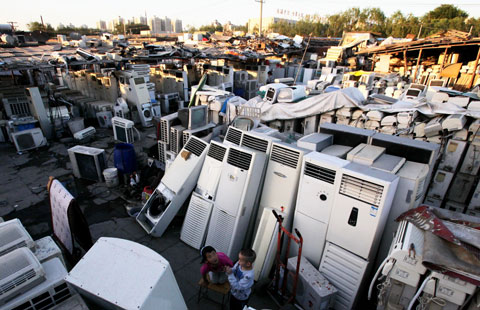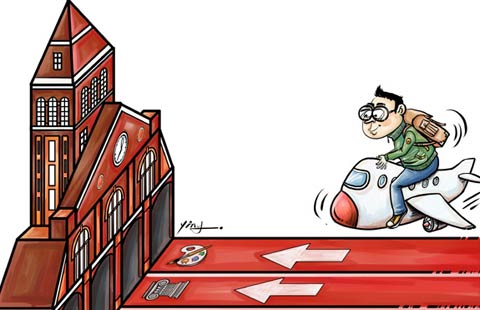Pyramid scheme hits the homeless
By Xu Jingxi in Guangzhou, and Hu Yongqi and Zhang Yuchen in Beijing (China Daily) Updated: 2012-08-06 09:28In 2011, the local authorities in Shenzhen, an industrial hub in Guangdong, began to categorize the homeless, basing the help they received on the reasons they ended up on the street. Those whose unfortunate circumstances were shaped by mental or physical disability received more aid than people who simply didn't want to work. The idea caught on rapidly, and in April the government of Yichang in Hubei province followed suit.
Hu Zhenhua, director of the Shenzhen Institute of Urban Management, said homeless people can solicit donations, but have to be overseen.
Homeless people with diseases or disabilities should be given shelter at social assistance stations, providing they don't hassle people or disturb the peace in their quest for cash. However, organized begging is deemed unacceptable, he said.
In August 2009, five ministries, including the Ministry of Civil Affairs, pushed through a new regulation on the management of the urban homeless. Any professional beggar hassling others and affecting the urban environment would face a crackdown. Vagrants unable to find a place to live could resort to social assistance stations for free accommodation.
"Our officers encourage homeless people to get help from social assistance stations. If they don't want to, the officers are forced to move them from vehicle lanes and sidewalks where they could easily get injured if cars run into them," said Zhang Jianjun, deputy director of the inspection team at the Shenzhen bureau of urban management.
Shenzhen's policy that urban management officers would be fined if any vagrants were found on the street was abolished in July, after it was criticized by netizens.
In 2005, the Guangzhou city government set up teams to patrol every district and county to provide help for vagrants at social assistance stations.
The downtown branch of Guangzhou Salvation Management Station can accommodate 300 vagrants and the patrol team takes 30 to 40 people to the social assistance station every day.
"Generally, local governments should be lenient toward the homeless because most of them are underprivileged," said Li Yingsheng, a professor of sociology at Renmin University of China in Beijing.
Hard to implement
In 2005, foreign visitors to Guangzhou complained that beggars at the hotels and airports grabbed their legs and refused to let go until they were paid, said Zeng Peng, a patrol team director at the downtown branch of Guangzhou Salvation Management Station. "Our presence can disturb their 'begging business' by regularly patrolling the streets," he explained.
However, Zeng and his team have been shown the cold shoulder on many occasions, such as the time a man found eating leftovers from a trashcan declined food and water offered by Zeng's teammate.
According to regulations, homeless people have to ask for help to receive any sort of aid, thus making Zeng's work difficult. He said the patrol team often spends hours attempting to persuade homeless people with serious illnesses, mental disorders or who exhibit violent behavior to request assistance.
"Our biggest headache is the beggars and rag pickers. China has no law forbidding begging or rag picking," said Zeng. What's worse is that some culverts in the city have become dens for drug addicts and criminals such as thieves and robbers.
Zeng's work can be dangerous: Vagrants often attack the patrols, throwing stones at them or cutting them with knives. Zeng said that around 30 such incidents occur across the city every year.
Better administration of the homeless requires not only new laws and regulations regarding begging and rag picking, but also the improvement of the social welfare systems in the rural areas, he said.
"The local governments in these areas should offer sufficient help to poverty-stricken local people so that they won't need to travel to another city to make a living by begging or rag collections," said Zeng.
However, whatever changes are implemented, they won't make much difference to Zhou Yongquan. "The years of being homeless have made me accustomed to all the things here. I don't want to go back to living in a house or an apartment. What I really want is more help from the government instead of more administration."
Contact the reporters at huyongqi@chinadaily.com.cn, xujingxi@chinadaily.com.cn and zhangyuchen@chinadaily.com.cn
- Seven villagers murdered in N China
- China steps up tobacco control efforts
- Five jailed for separatism in Xinjiang
- Letter asks for leniency in poisoning case
- Antibiotics in surface water pose 'indirect health risk'
- Tianjin airport opens up transit link to Beijing
- High levels of antibiotics in China's major rivers
- China to dig tunnel for Asian rail system
- Bering strait line to US possible, experts say
- China: Stop oil rig harassment







